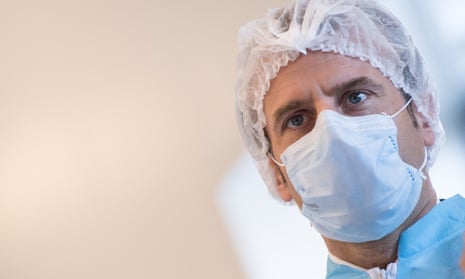France will lift most of its Covid restrictions on Monday, scrapping Emmanuel Macron’s flagship vaccine pass and ending compulsory indoor mask-wearing in schools and many public spaces, as the government vows to ease pressure on French people’s daily lives despite a rise in infections.
Less than month before April’s presidential vote – with polls showing the centrist Macron is favourite to win re-election – the government has brought forward its promise to ease restrictions before the summer.
From Monday, schoolchildren aged six and over will not have to wear masks inside classrooms, for the first time since September 2020. Masks will no longer be mandatory in shops, public services or workplaces. But masks will remain compulsory on all public transport, as well as at hospitals and for people visiting elderly loved ones in care homes.
The prime minister, Jean Castex, conceded in an interview this weekend that there had been an upturn in cases “like everywhere in Europe”, but he said pressure on hospital emergency wards was going down and the BA2 variant of Omicron was more contagious but “seemingly less dangerous”.
Castex said that while the government continued its strategy of easing restrictions, he “strongly recommended people who are vulnerable because of their age or pathologies to keep wearing masks in indoor spaces”.
The end of the vaccine pass means that for the first time since last summer, people no longer need to show a QR code to eat out in a restaurant, go to a cafe, work out at the gym, board a long-distance train, go to the cinema or borrow a library book.
Macron first introduced a “health pass” in July 2021, making it compulsory to have proof of either vaccination, recovery from Covid or a negative test to enter places such as museums, restaurants and bars. Although the policy led to some street protests, it had the support of the majority of the public in polls and helped to push up vaccination levels: more than a million people made a vaccine appointment in the 24 hours after Macron announced the first health pass last summer.
In January Macron hardened the health pass by turning it into a “vaccine pass”. This meant a negative test was no longer enough and full proof of vaccination was necessary to enter places including cafes, restaurants, cinemas, libraries and long-distance trains.
Just before the vaccine pass was introduced, Macron said he wanted to dump non-vaccinated people “in the shit” by making their daily lives as difficult as possible – a deliberately radical statement aimed to appeal to his centrist electorate, which was overwhelmingly vaccinated and exasperated at the ongoing coronavirus crisis.
But the country now has one of the highest rates of vaccination in Europe, at more than 90% of those eligible, and a vaccine pass is no longer seen as necessary by the government. From Monday France will begin giving a fourth dose of vaccines to people aged 80 and over.
The health minister, Olivier Véran, said the government remained “extremely vigilant”, and contamination rates had shown a 20% rise over the course of last week. He defended the government’s decision to lift restrictions but said vulnerable people “must continue to protect themselves”.
The easing of Covid restrictions weeks before the presidential election was seen as a deliberate move to lighten the burden on people who polls have shown are “fatigued” by the pandemic and now increasingly worried by the war in Ukraine.
An Ifop poll for the Journal du Dimanche last month showed 71% of people were in favour of lifting the vaccine pass before the summer, including a high number of business owners.
Despite difficulties such as a lack of masks at the start of the pandemic and a slow start to the vaccine programme, and anger over confusing rules in schools at the start of this year, Macron has been broadly trusted by voters to handle the Covid crisis, polls suggest, particularly in terms of protecting the economy.
With the war in Ukraine, Macron’s poll scores have risen – a poll for Les Echos this month found 40% of people trusted him to “efficiently deal with the main problems facing the country”.
But voters do not want war in Ukraine to be the only subject on the table in the run-up to the elections, and many continue to worry about the state of the health system. An Ifop poll for the Hospital Federation of France on Sunday found 91% of voters were concerned there were not enough healthcare staff in France. A majority of voters felt staff should be better paid, state hospitals better organised and care for elderly people improved, as well as adding more doctors in rural areas.
